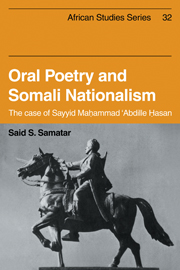Book contents
- Frontmatter
- Contents
- List of illustrations
- List of figures
- List of tables
- Note on transcription of Somali words
- Preface
- Introduction
- 1 Elements of Somali pastoral oratory: Prose
- 2 Elements of Somali pastoral oratory: Poetry
- 3 Occupation and resistance: The rise of the Somali Dervishes
- 4 Poetic oratory and the Dervish movement
- 5 Myth and the Mullah
- Notes
- Select bibliography
- Index
- Titles in the series
1 - Elements of Somali pastoral oratory: Prose
Published online by Cambridge University Press: 07 May 2010
- Frontmatter
- Contents
- List of illustrations
- List of figures
- List of tables
- Note on transcription of Somali words
- Preface
- Introduction
- 1 Elements of Somali pastoral oratory: Prose
- 2 Elements of Somali pastoral oratory: Poetry
- 3 Occupation and resistance: The rise of the Somali Dervishes
- 4 Poetic oratory and the Dervish movement
- 5 Myth and the Mullah
- Notes
- Select bibliography
- Index
- Titles in the series
Summary
THE CULTURAL MILIEU
While a general treatment of the range and categories of Somali oralliterary forms and genres along with their cultural significance and social functions is beyond the scope and intent of this study, a precursory look into a few arbitrarily selected themes of pastoral oratory and rhetoric may prove helpful. Although a formal study of Somali pastoral arts of oratory and skill in public speaking remains to be undertaken, few students of Somali language and culture have failed to observe the importance of artistic speech in Somali pastoral life. The works of such scholars as Richard Burton, M. Maino, Margaret Laurence, B. W. Andrzejewski and I. M. Lewis refer to the Somalis as a ‘nation of bards’. Their appraisal is echoed by Somali commentators on numerous occasions, most notably by the late president of the Somali Republic, Dr ʿAbdirashiid ʿAli Shermaarke, who spoke of his countrymen's lyric verse as ‘one of the two national assets of inestimable value’. The other asset the president had in mind was Islam, and in putting poetry on the same level as Islam, the president paid no small tribute to his country's poetic heritage.
If not also a nation of nomads, the Somalis are a nation in which nomadic pastoralism plays a dominant role in the life of the people. Not only do more than half of the Somali people still continue to pursue pastoralism as the chief mode of economy, but urbanized nomads dominate the modern state.
- Type
- Chapter
- Information
- Oral Poetry and Somali NationalismThe Case of Sayid Mahammad 'Abdille Hasan, pp. 8 - 54Publisher: Cambridge University PressPrint publication year: 1982



